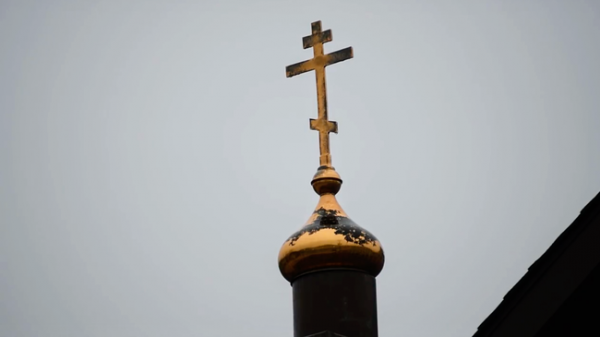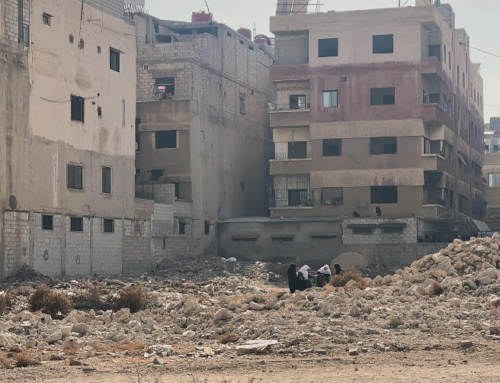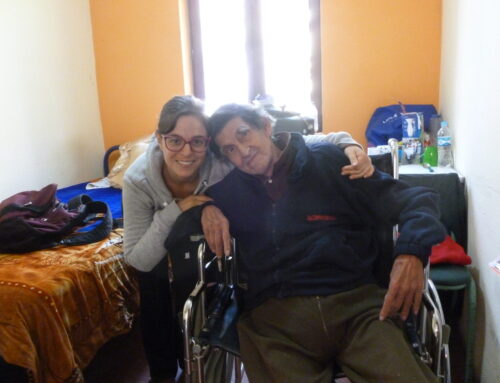“You’ve got mail,” my husband said to me, handing me a small envelope. “It’s from the monastery,” he continued. “This can’t be good,” I thought out loud. In 2017-2018, I conducted fieldwork in Appalachia with a large and growing community of converts to the Russian Orthodox Church outside of Russia (known by the acronym ROCOR), the majority of whom considered themselves to be deeply or ultra conservative on the United States’ spectrum of social or moral politics. My research focused on why these believers converted to ROCOR, and the social, political, and economic factors that might have influenced them to shift religious affiliations. In 2019, a short article of mine on Orthodox conversion, Russia, and the global culture wars appeared on the Berkley Forum. That piece of public scholarship caused a wave of angry tweets, Facebook posts, emails, and letters from converts to come my way. For those of us who work with groups that ascribe to far different politics than our own, it is often difficult to navigate not only the ethics of fieldwork, but also the inevitable fallout from politics of representation. As an anthropologist who has experienced both of these challenges recently, I find that these two issues bring to the fore longstanding questions we anthropologists sometimes have about how to best convey “the memory of living men” (Malinowski 1922, 3). Issues of fieldwork ethics and representation are not unique to those of us working with the far-right, but it can often feel that way. This might because we have yet to build solid theoretical and methodological approaches for working with and representing many of these rapidly transforming communities, both in person and in digital media worlds.
In the late fall of 2019, articles in both Anthropology News and the Network for Ethnographic Theory (NET) of the European Association of Social Anthropologists website highlighted the study of right-wing communities. Both of these online contributions to the growing body of literature on the topic nodded to the disquiet anthropologists researching far-right communities sometimes feel. Studies of far-right communities are few and far between, and those who do attend to the lifeworlds of “unlikeable others” often question how and by what means ethnographic engagement should take place (Pasieka 2019). While there are many reasons why so few anthropologists work with far-right, ultra conservative communities, one of the paramount issues is often access. Sociologist Katherine Blee notes that ethnographies of “right-wing” extremism are often conducted at a distance (Blee 2007). Close-up, macro studies of communities are often limited by access. Surprisingly, access was the least of my challenges; my years of working in other Orthodox Christian communities meant I had many clergy and laity who could vouch for me as a good person.
During fieldwork, I was acutely conscious of how to employ ethnographic methodologies that were ethical and deeply rigorous. In a similar fashion to Jessica Marie Falcone (and Vincent Crapanzano before her), I “never lied, but I never told the whole truth either,” primarily because no one asked me about my political views or social stances (Falcone 2010, 249). A few scholars, such as ethnomusicologist Benjamin Teitelbaum, who studies what anthropologist Agnieszka Pasieka terms the “unlikable others,” focus on scholar-informant solidarity through covert means (Pasieka 2019; Teitelbaum 2019). Instead, like other scholars who have worked with conservative communities such as Faye Ginsburg, Susan Harding, Omri Elisha, and Robert Wuthnow, I sought simply to listen. Much in the vein of Faye Ginsburg’s work in the 1980s on abortion proponents and opponents in Fargo, North Dakota, I carried out thirty-six life-story interviews or what I have termed “conversion narratives” with Orthodox Christians (Ginsburg 1989). These conversion narratives were combined with formal interview questions about demographics and social, political issues; this hybrid interview methodology allowed me to glean a holistic understanding of each person I interviewed. The conversion narratives helped explain why converts decided to be a part of this particular Orthodox community. These hybrid interviews were one of many methods I used during my year of fieldwork. I conducted participant observation by attending regular ROCOR church activities, immersing myself in community life, and conducting semi-formal ethnographic interviews with a variety of people from inside and outside of the Orthodox community, from monks to parishioners, to their non-Orthodox neighbors who attend other churches.
From the onset, I let the interests of my interlocutors guide my research during my stay with the community. Because the topics they often talked about were sensitive, both politically and socially, it was important for me to maintain strict protocols for interviewing that not only aligned with the guidelines handed down by my university’s Internal Review Board, but also felt right to me ethically. All interviews were audio recorded with permission noted during the audio recording. If individuals asked to see a fixed set of questions in advance, I obliged their requests. This sometimes meant that questions would go unasked if a participant felt uncomfortable answering them. This method proved to be effective, for many members told me that I was the first person outside of the community to care about their views or listen to their ideas. Of course, it was my job as an anthropologist to listen carefully and try to understand how they see the world and what motivates them, even if I did not agree with them. Despite ideological differences, I was deeply involved in the life of the community. I was there for weddings, funerals, birthdays, parties, baptisms, benevolent care, and the list goes on. I established rapport, friendship, and respect, all while asking questions about sensitive political topics. During those twelve plus months, the conservations followed freely with the understanding that I was there to learn and write about this community, using their words to represent them to the world.
When I returned home to write, I wrestled with the post-fieldwork challenges that often accompany the production and dissemination of academic writing that might represent a community far differently than they anticipated. Since the reflexive turn in the 1980s, anthropologists have been critically focused on issues of representation, bias, and political ramifications for both researcher and their informants. Scholars, such as those represented in the 1993 edited volume When They Read What We Write, have highlighted the social risks that accompany representation, for all parties involved. Yet unlike anthropologists who work in communities they can champion through activist methods, those of us who work with deeply different ideological groups often find ourselves in painfully difficult social situations—ones that draw out the fluidity of social acceptance and the grief of exclusion from former field sites. In early February 2020, my Berkeley Forum article was posted in a closed Facebook group devoted to the study of ROCOR. That singular post served as the launch site for a social media posting frenzy among ROCOR Christians over the course of the next few weeks.
Acknowledging their own beliefs about Putin and the United States, converts I worked with outed themselves on social media to take issue with the idea that conversion might be political, despite the fact that they, in their own words, had expressed this idea repeatedly. They were upset that I wrote about them, even though they sat with me for hours, talking about their theological and political ideologies. One of the most vocal informants messaged me on Facebook to say that “Even if I were not Orthodox, I would admire Putin, but I reject the inference that we are somehow more loyal to him or Russia than our own country.” He went on to complain more about my representation of him, before ending with “I am still American, and I do love our country.” Representation means something different to each person. As an anthropologist, it is my job to examine the data I gather, process it through the lenses of social science, and try my best to contextualize it within the larger social histories, narratives, trends, and events that form the crucial context for the work. When this convert told me in 2017 that he hoped Putin would invade the United States, he did so seriously, willingly, openly, and without hesitation–and he did so on the record. I was far less concerned about the social optics of the situation than I was about my interlocutors’ understandings of my analysis of their words, actions, and beliefs. Given the unpredictable political moment in which we find ourselves, it is important for me going forward to heavily incorporate the unedited voices and views of the believers themselves into my work, for each person I talked with, interviewed, and observed had a slightly different take on the larger social issues we discussed.

The politics of ethical fieldwork and the pushback I received over representation are part of larger sociopolitical issues of we find in our discipline and often among our collaborators. Namely, it highlights long-held social biases on both sides and assumptions about particular political agendas. In her introduction to a 2007 special edition of the Journal of Contemporary Ethnography that was devoted to far-right research, Katherine Blee noted that: “[S]cholars of the far right often confront the tangled issues of balancing scholarly ethics of fairness to the subject with moral and political interests in exposing and helping to disable the very movements they are studying” (Blee 2007). Certainly, Blee is correct in her assessment of the ethical quandary that far-right researchers find themselves in during the writing process as we try to represent community members. However, my goal was not to disrupt this community; rather, I sought to highlight how their sophisticated transnational political ideologies have found a home in an area of the United States that has been long marginalized in the American public consciousness. Doing so allowed me to ask to ask larger social questions, such as: What role does religion play in the support or demise of Western democracy? How is Americanness understood and performed?
Over the course of spring 2020, before and during the Covid-19 pandemic, I received emails and letters asking me why I would depict this community as supportive of Vladimir Putin and the conservative Russian government. One person asked if I hated them. Members of this community seemed to latch on to the idea that anthropologists might be more interested in disrupting rather than learning about a community. Others labeled anthropology a “pseudoscience” with a “liberal agenda.” This idea seems to be part of the long-standing assumptions conservative communities have about academics and their political ideologies. On the other side of this situation, anthropologist Grace Carey reflects on how academics’ views of the “repugnant others” often include emic/etic language tropes that suggest inaccurately that “all anthropologists share a homogenizing political orientation” (Carey 2019; Harding 1991). These tropes also serve to reinforce notions of alterity and otherness that many of us, in the push to decolonize anthropology, have sought to move away from as quickly as possible. The community reaction to my representation of them highlights the larger, systemic issues of othering and bias that are found in both anthropology and in many of our research communities.
In the past six months, I have responded to text messages and Facebook posts from angry community members. I have explained my project countless times, just as I did when I was living in West Virginia. I have yet to respond to the emails and letters from monastery members. Each time I sit down to write a letter, I am overwhelmed by anger and grief. I am angered that my attempts to render this community fairly and intelligibly became social media fodder that fueled ad hominem attacks. I am grieved by the loss of not only access to this community, but also of the relationships I have made there in the past five years. In an increasingly antagonistic social ethos in the United States, where dialogue often falls to the wayside in favor of political polemics, I am still grappling with how to continue working on this topic in ways that are data focused and attuned to the political intricacies of representation.
As these ultra-conservative groups to continue grow around the world, the need to understand their social and political dynamics must push us to deep dig in our ethnographic toolkits to find methods of access, inquiry, and representation that help us to better portray the lifeworlds of these communities, despite the resistance and inevitable pushback. Of course, it is hard listen to my own advice, especially when people whom I lived with, drank with, and thought with, suggest that it will be my fault if someone “burns their church to the ground.” In his work on representation and aboriginal communities in the 1980s, Fred Myers notes that “With increasing awareness of the political and situated dimensions of our own discourse, we are in a new phase of the anthropological project in which ethnographers and subjects confront each other, mutually, as agents.” (Myers 1986, 152). While Myers was writing in a far different social, political, and even geographical context, his words hold salience for us now, especially for those of us working in the United States during this contentious and tumultuous political moment. This is a moment that calls for a return to the reflexivity that helped transform our field. A moment that pushes us to reexamine our methodologies, to be attuned to the burden and privilege of representation and to remember what the task of graphing the ethos entails.
References:
Blee, Katherine. 2007. “Ethnographies of the Far Right.” Journal of Contemporary Ethnography, 36(2): 119–128.
Brettell, Caroline, ed. When They Read What We Write. Westport, CT: Bergin and Garvey, 1993.
Carey, Grace. “Anthropology’s “Repugnant Others.” American Ethnologist website. April 23, 2019. http://americanethnologist.org/features/reflections/anthropologys-repugnant-others.
Falcone, Jessica Marie. 2010. “‘I spy…’: the (im)possibilities of ethical participant observation with antagonists, religious extremists, and other tough nuts.” Michigan Discussions in Anthropology 18 (1): 243-282.
Ginsburg, Faye D. Contested Lives: The Abortion Debate in an American Community. Berkeley: University of California Press, 1989.
Harding, Susan. 1991. “Representing Fundamentalism: The Problem of the Repugnant Cultural Other.” Social Research 58 (2): 373-393.
Malinowski, Bronislaw. 1992. The Argonauts of the Western Pacific. New York: E.P Dutton & Company.
Myers, Fred. 1986. “The Politics of Representation: Anthropological Discourse and Australian Aborigines.” American Ethnologist 13 (1): 138-153.
Pasieka, Agnieszka. 2019. “Anthropology of the far right: What if we like the ‘unlikeable’ others?” Anthropology Today 35: 3-6.
Teitelbaum, Benjamin. 2019. “Collaborating with the Radical Right: Scholar-Informant Solidarity and the Case for an Immoral Anthropology.” Current Anthropology 60 (3).
Cite as: Riccardi-Swartz, Sarah. 2020. “Fieldwork and Fallout with the Far Right.” American Ethnologist website, 18 June 2020, [https://americanethnologist.org/features/reflections/fieldwork-and-fallout-with-the-far-right]
Sarah Riccardi-Swartz is the postdoctoral fellow for the Recovering Truth: Religion, Journalism, and Democracy in the Post-Truth Era project at the Center for Study of Religion and Conflict at Arizona State University. Her research is on Russian Orthodoxy in the United States deals with religious conversion and transnational political movements.




